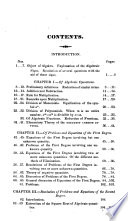 | Bourdon (M., Louis Pierre Marie) - Algebra - 1831 - 446 pages
...raise an'tnvariable number, to form all these numbers, an idea will be had cf a table of logarithms. The logarithm of a number, is the exponent of the power, to which it is necessary to raisj a certain invariable number, in order to produce the first number. The invariable... | |
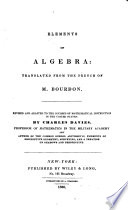 | Charles Davies - Algebra - 1835 - 378 pages
...invariable number, to form all these numbers, an idea will be had of a table of logarithms. Hence, The logarithm of a number, is the exponent of the power to which it is necessary to raise a certain invariable number, in order to produce thefirst number. Any number,... | |
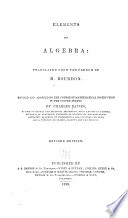 | Algebra - 1838 - 372 pages
...invariable number, to form all these numbers, an idea will be had of a table of logarithms, Hence, The logarithm of a number, is the exponent of the power to which it is necessary to raise a certain invariable number, in order to produce thefrst number. Any number,... | |
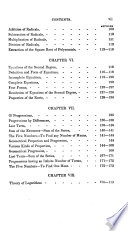 | Charles Davies - Algebra - 1842 - 284 pages
...by Jlf, a"=M Thus, if we make m=0, M will be equal to 1; if wi=l, M will be equal to 10, &.C. Hence, The logarithm of a number is the exponent of the power to which it is necessary to raise the base of the system in order to produce the number. 1 76. Letting, as before,... | |
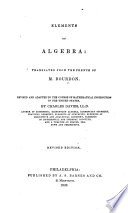 | Charles Davies - Algebra - 1842 - 368 pages
...invariable number, to form all these numbers, an idea will be had of a table of logarithms. Hence, The logarithm of a number, is the exponent of the power to which it is necessary to raise a certain invariable number, in order to produce thefirst number. Any number,... | |
 | Thomas Sherwin - Algebra - 1842 - 326 pages
...Tables of logarithms in common use, are constructed upon the number 10 as a base. Hence, The common logarithm of a number, is the exponent of the power to which 10 must be raised, in order to produce that number. Thus, 3 is the logarithm of 1000, because 103 =... | |
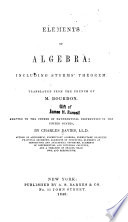 | Charles Davies - Algebra - 1845 - 382 pages
...of that number ; and the invariable number a is called the bose of that system of logarithms. Hence, The logarithm of a number, is the exponent of the power to which it is necessary to raise an invariable number, called the base of the system, in order to produce the... | |
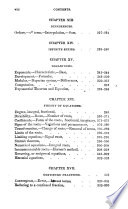 | Stephen Chase - Algebra - 1849 - 348 pages
...sometimes also the RADIX (§23. d), of the system. Hence, for a given base, § 312. The logarithm of any number is the exponent of the power to which the base must be raised, to produce that number. Thus, 2 is the logarithm of 100 to the base 10 ; because ~2 is the exponent of the power... | |
 | Charles Davies - Algebra - 1850 - 292 pages
...by M, am=Jlf Thus, if we make m=0, M will be equal to 1; if w=l, M will be equal to 10, &,c. Hence, The logarithm of a number is the exponent of the power to which it is necessary to raise the base of the system in order to produce the number. 1 TO. Letting, as before,... | |
 | George Wirgman Hemming - 1851 - 176 pages
...the logarithm of the number N to the base a ; that is, the logarithm of any number to a given base is the power to which the base must be raised to produce the number. This is commonly expressed by the equation x=logaN 32. When the logarithms of numbers to any given... | |
| |